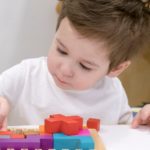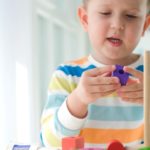The onset of verbal communication is a turning point for young children. Says Dubai’s Camali Clinic in advising parents to encourage positive language and effective communication at home.
Language development in children is something that parents look forward to immensely. As this is the time when a little one’s individual personality and view of the world starts to show itself.
And according to experts at Camali Clinic – the UAE’s leading specialist Child and Adolescent Mental Health Service (CAMHS). Promoting positive communication and language development at a young age is highly important as language. The clinic says it plays a crucial role in:
“enabling children to understand, organize, and retrieve rules that contribute to emotional and behavioral regulation.”
“Language is a means to express one’s own behavior and emotions and those of others,”. Children who are able to say: “‘I am mad’ or ‘I am sad’” are more likely to gain the support and understanding of adults than those who throw temper tantrums or become violent. Temper tantrums are common in preverbal children. When a toddler lashes out they are telling you in the only way they know how that something is bothering them.
The Dubai clinic notes having some of the region’s best Speech and Language Pathologists (SLPs). And they provide life changing treatment, support and care for children who have difficulties with communication. This includes:
- – Receptive and expressive language development.
- – Pragmatic skills (including eye gaze, turn taking, shared attention).
- – Nonverbal communication.
- – Lack of language processing skills.
- – Social language difficulties.
Interestingly, due to the high diversity of nationalities and therefore high number of bilingual homes. One issue that is common in this country is developmental issues which parents cause by not sticking to one language when raising their young child.
“A lot of children here come from bi and tri lingual homes. And often parents will use two or three languages in the same sentence which creates confusion for the child trying to learn to communicate. The child then tries to communicate their wishes and wants and gets frustrated and distressed when they are not being understood. Consistency is crucial for the child as he or she begins to associate the parent with the individual language. And measuring his or her progress can be by how the parents adhere to this rule.”
Camali Clinic’s Top 3 Parental Tips for Communicating well with your Toddler
-
Don’t Just Point and Grunt
First of all, children are a lot smarter than we give them credit for. While it may be easier for a child to point at a toy and coo at it, and easy for parents to simply hand it over to them, a simple exercise will help stimulate conversation. Try to prompt and wait for any response, praise it and raise the bar at each stage.
-
Avoid Baby Talk
Secondly, avoiding baby talk and using adult language with your toddler will develop and challenge their language skills. You can pretend that you don’t understand what your child’s non-verbal language means. We may understand that words like “num num” means “I’m hungry!” and it will be easier to give your child food, however to develop your toddler’s speech, ask them what they mean. Don’t underestimate your children – sometimes asking for a clarification is the push they need to get their communication going.
-
Don’t feel alone – try Parent Sessions
Finally, the clinic often gets questions from parents about how to encourage positive speech and effective communication at home. Every week, it holds sessions and talks for parents on how they can translate positive communication into practice. It is also a safe and open space to share ideas and common, and not-so common, issues.







This content is incredibly informative. Watch world cup dubai horse racing — odds, racecards, and results. mobile and desktop friendly. stats and timings, track conditions, post‑race interviews. clear commentary and analysis.
Awesome post! Join the fun at https://sugongfang.com for up to R$1,000 welcome bonus, progressive jackpots, and instant PIX withdrawals. Date: 2025-10-27 20:51:05 (-03).
Awesome post! Join the fun at https://lxp-owhatsapp.com WhatsApp 网页版提供的搜索功能,方便用户快速查找历史消息。 . Date: 2025-11-27 11:56:29 (-03).
好文!。日期:2026-01-10 08:18:54 (-03)。
好文!。日期:2026-01-31 18:22:37 (-03)。